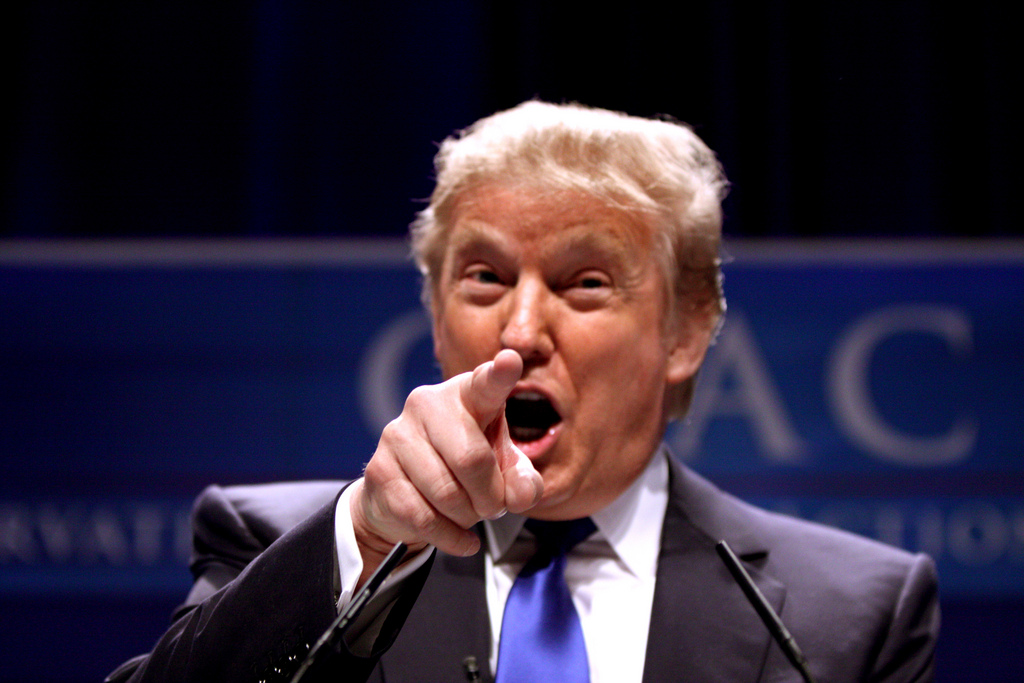Donald Trump’s Foreign Policy: Bullying, Domination, and Fearmongering
When pundits and defense intellectuals fret about Donald Trump’s foreign policy (if “policy” isn’t too grand a name for what often amounts to little more than improvised verbal grenades), they point to provocative positions he has taken on particular issues. He’s wanted to know why we can’t use nuclear weapons. He has suggested that we might let Japan and South Korea go nuclear. He has threatened to abandon NATO allies if they don’t pay more into the alliance, and he’s remarked that he might not defend the Baltic states against Russia—a statement that was compounded by his close ally Newt Gingrich’s comment that Estonia is practically in the suburbs of St. Petersburg.
But Trump is a menace to global security not so much because of specific policy positions (which, as any Trump observer knows, could change overnight) but because of what might happen if he were given free rein to play out his personal psychodrama on a world stage.
By all appearances, Trump is an insecure man who pumps up his ego by bullying others and publicly performing dominance over them. In the words of commentator Josh Marshall, “The need to assert dominance is at the root of all of Trump’s actions. His whole way of understanding the world is one made up of dominators and the dominated. There’s no infinite grey middle ground, where most of us live the vast majority of our human relationships.”
Trump’s pattern of ripping off contractors who work on his buildings is a way of showing that he can do as he pleases, while his victims have no recourse. His trademark phrase—“you’re fired”—is the ultimate performance of dominance. Moreover, instead of treating his opponent Hillary Clinton with the show of respect that is customary in presidential debates, he threatened to jail her if he became president. And his reaction to revelations that he had demeaned and probably assaulted women—which would have elicited an abject apology from any normal politician—was to threaten any Republican who withdrew their support for him.
In other words, his first instinct—and with Trump the first instinct is also the last instinct—is to bully, bluster, and threaten. But there is a reason President Theodore “Teddy” Roosevelt advised U.S. leaders to “speak softly but carry a big stick.” Diplomacy by threat often turns out to be disastrous.
In international affairs, nations are constantly jostling for position with one another in what amounts to a nonstop game as they sign trade deals, make aid agreements, enter into alliances, and so on. But sometimes the game turns deadly serious as vital interests are threatened and red lines are drawn. Consider, for instance, when President John F. Kennedy threatened war with the Soviet Union if it stationed nuclear weapons in Cuba. One role of loud threats is to publicly signal that vital interests, on which compromise may not be possible, are now in play.
Diplomacy by threat often turns out to be disastrous.
If a leader conducts diplomacy by constant threat, they will find themselves operating a loudspeaker without volume control. They will lose the ability to signal which interests are central and which are more peripheral. North Korea’s Kim Jong Un, a leader with whom Trump shares bizarre hair and an autocratic temperament, has put himself in this situation by delivering a constant stream of dire threats to unleash military force. Because North Korea’s threats seem so overblown, none are taken seriously, and Kim Jong Un is widely perceived as an uncouth buffoon. North Korea is good at grabbing headlines but not at bending other nations to its will. Its threats go hand in hand with the country’s diplomatic isolation.
Threats can be particularly inflammatory in certain cultural contexts. East Asian nations such as Japan, for example, attach great importance to “face”—the public performance of respect—and its politicians would not respond well to diplomacy in Trump’s cowboy vernacular. In other cultural contexts, threats run the risk of activating a masculine code of honor that may literally put death before dishonor. The Pashtuns, the people who make up much of Afghanistan and Pakistan, fall into this category, and one trembles to think what calamities a President Trump might conjure in Afghanistan with crude demands for subservient policy.
There is also the danger that a leader backs himself into a humiliating corner when he issues a serious threat that is ignored or dismissed. President Barack Obama learned this the hard way when he said that Syria’s President Bashar Assad would be crossing an American “red line” if he used chemical weapons on his own people—only to do nothing when Assad did just that. Drawing a meaningless line in the sand weakened the U.S. in Syria, and it damaged Obama’s credibility. Trump’s behavior suggests that, as president, he might have responded by escalating the situation rather than backing down. And that would run the risk of getting the U.S. into another ill-conceived Middle Eastern war.
Barring an unexpected plot twist, it looks as if Trump will not get to issue boasts and threats from the Oval Office. If that is the outcome, the United States and the world will have dodged a bullet. But we have to ask ourselves the deeper and more troubling question: What does it mean that one of the major parties nominated such a person as its leader and that his reckless approach to foreign affairs—while promising to “make America great again”—viscerally excited large swaths of the population?
I once heard Ken Livingstone, the former mayor of London, speak with pride about how the United Kingdom had managed its imperial decline and become a better, more multicultural country that accepted the limits of its power. He added that he feared America in decline would take a different path, threatening to pull the temple down on everyone else as it lost its global dominance. What he feared was inchoate at the time. But now it has a name: Trumpism.


























